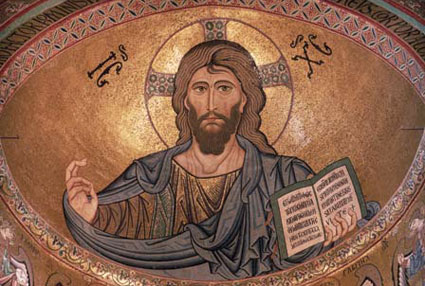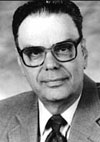
December
2009 - Vol. 35

Jesus Christ Pantocrator (1148
AD), mosaic, dome of Cathedral of Cefal, Palermo, Italy
The
Finality of Christ
and
Religious Pluralism
The battle between
catholic evangelicalism and neo-Gnosticism
by Donald Bloesch
Coexistence of
conflicting religious claims
With the rise of neo-Protestant theology in the eighteenth and nineteenth
centuries and neo-Catholic theology in the twentieth century, a new theological
model has emerged into prominence that seriously calls into question the
exclusivistic claims of traditional Christian faith. The new paradigm has
been facilitated by the Church’s encounter in the early nineteenth century
with Romanticism with its emphasis on individuality, pluralism, and relativism.
It was Schleiermacher (d. 1834) who exulted in the plurality of the modern
world: “Let none offer the seekers a system making exclusive claim to truth,
but let each man offer his characteristic, individual presentation.”1
The History of Religions school associated with such names as Ernst
Troeltsch (d. 1923) and Johannes Weiss (d. 1914) also paved the way for
modern relativism and pluralism. For Troeltsch there is no final revelation:
the Divine Life within history always manifests itself in new and peculiar
individualizations. Truth has many forms; ultimate reality is necessarily
apprehended in a variety of ways, all of which have some claim to validity.
The emerging philosophy of pragmatism from the later nineteenth century
on gave additional impetus to the slide toward relativism and pluralism.
William James (d. 1910), who has had a unmistakable influence on both process
theology and New Age theology, advanced the notion of a pluralistic universe,
which allows for the coexistence of conflicting religious claims.
Uniqueness of
Christian revelation called into question
More recently, with the rise of the “theology of religions,” the uniqueness
of Christian revelation has been further called into question. Paul Knitter
of Xavier University in Cincinnati says that we need to “recognize the
possibility that other ‘saviours’ have carried out . . . for other people”
the redemptive work which as Christians we know in Jesus Christ.2
For Knitter the common ground of religion exists in the struggle to liberate
the oppressed peoples of the world. Eugene C. Bianchi upholds a “Christian
polytheism,” which allows for other savior figures besides Christ. Hans
Küng contends that a person “is to be saved within the religion that
is made available to him in his historical situation. Hence it is right
and his duty to seek God within that religion in which the hidden God has
already found him.”3
Calling for a “global religious vision” John Hick avers that it is no longer
necessary “to insist . . . upon the uniqueness and superiority of Christianity;
and it may be possible to recognize the separate validity of the other
great world religions. . . .”4
The ascendancy of the new theological orientation can be described in
various ways. Samuel Moffett, veteran Presbyterian missionary to Korea,
views the nineteenth century as the age of missions, the early and middle
part of the twentieth century as the age of ecumenism, and the present
period as the age of religious pluralism. New Agers describe this last
stage as the “Age of Aquarius,” marked by the celebration of the intuitive
over the cerebral. Whatever images are used, it cannot be doubted that
an exclusive monotheism is being challenged and in many cases supplanted
by a religious pluralism that borders on syncretism.
Go
to > Next
Page | 1
| 2
| 3
| 4
| 5
| 6
| 7
| notes
|
[This
article was originally published in Touchstone:
A Journal of Mere Christianity, Summer 1991. Touchstone
is a monthly ecumenical journal which endeavors to promote doctrinal, moral,
and devotional orthodoxy among Roman Catholics, Protestants, and Orthodox.
Copyright
© 2004 the Fellowship of St. James. Used with permission.].

|
Donald Bloesch (b. 1928)
is a noted American evangelical theologian. He is Professor Emeritus of
Theology (1957-1992) at Dubuque Theological Seminary, Dubuque, Iowa, U.S.A..
Bloesch earned a B.A. from Elmhurst College, a B.D. from Chicago Theological
Seminary, and a Ph.D. from the University of Chicago. He did postdoctoral
work at the universities of Oxford, Tübingen and Basel, and has written
numerous books including the seven-volume systematic theology, Christian
Foundations. |
. |
. |
|

